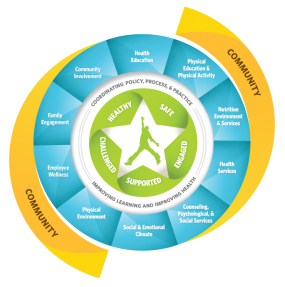School Wellness

Whole School, Whole Child, Whole Community (WSCC)
South Heartland District Health Department was awarded, several years ago, the Maternal and Child Health funding to support two priority community health goals: 1) Decrease the percentage of school-age children and youth who are overweight or obese in South Heartland District (Adams, Clay, Nuckolls and Webster Counties) and 2) Reduce alcohol use and binge drinking to protect the health, safety, and quality of life for young people under age 22 in South Heartland District;
Today, South Heartland District Health Department continues to work with schools implementing the WSCC model- previously known as Coordinated School Health (CSH) school wellness process. WSCC is a systems-building process by which schools, school districts, and communities can develop capacity and create an infrastructure that supports continuous improvement in health-promoting environments for students and staff. It is a vehicle for school improvement—improving students’ academic performance and overall physical, social and mental well-being by promoting health in a systemic way.
If your school is interested in starting a wellness team or implementing a systematic approach to address school health, please contact us! SHDHD is always looking for community and school partners to increase the health of our communities.
WSCC consists of two components: structure and process. The WSCC structure outlines ten components schools must address to tend to student’s holistic health needs:
- Physical education and physical activity.
- Nutrition environment and services.
- Health education.
- Social and emotional school climate.
- Physical environment.
- Health services.
- Counseling, psychological and social services.
- Employee wellness.
- Community involvement.
- Family engagement
The WSCC process is designed to purposefully integrate the efforts and resources of education and health to provide a full set of programs without duplication or fragmentation by emphasizing needs assessment; planning based on data; sound science; analysis of gaps and redundancies; and evaluation. The WSCC process model assists in the development of coordinated, comprehensive, multifaceted programming that enhances environmental supports and the capacity of the school to ensure its academic mission.
Schools trained through this model:
- Adam Central High School
- Alcott Elementary
- Harvard Public Schools
- Hastings District Office
- Hastings Middle School
- Hastings High School
- Hawthorne Elementary
- Lincoln Elementary
- Longfellow Elementary
- Watson Elementary
- Hastings St. Cecilia
- Superior Public Schools
PIES

Policy Implementation, Evaluation, and Sustainability
South Heartland continues to work with schools with the Student Wellness Works! Project will be providing additional training and technical assistance for School Health Advisory Council teams that completed the 2014-2015 Coordinated School Health Institutes, specifically including training and assistance for Policy Implementation, Evaluation, and Sustainability (PIES) of school wellness activities.
PIES Graduated Schools:
Harvard Public Schools
Hastings Middle School
Hawthorne Elementary
Lincoln Elementary
Morton/Watson Elementary
Hastings St. Cecilia
Superior Public Schools



